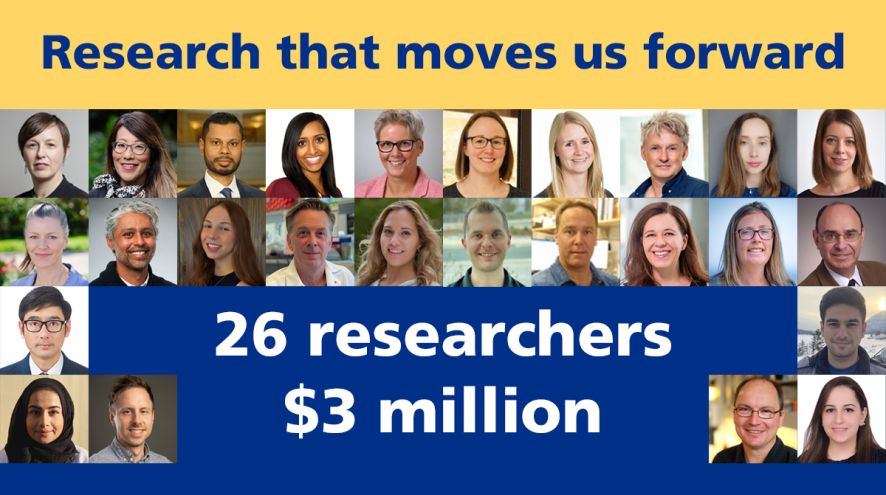2021 funding results
We're pleased to announce the 2021 grants and awards for the Alzheimer Society Research Program, funding Canadian researchers in the field of Alzheimer's disease and other dementias and investing in the future of dementia care in Canada.

The new ASRP-funded projects are categorized according to the following eight funding priorities. Select one to learn more about the people behind the latest innovative ideas in that area of dementia research!
- Cause
- Developing treatments
- Diagnosis and detection
- Epidemiology
- Improving care for people with lived experience
- Risk and prevention
- Therapy
- Translational
Cause
Cause
Tim Kennedy, McGill University

This researcher is a recipient of the Mike & Valeria Rosenbloom Foundation Research Award.
Title: Synapse dysfunction in Alzheimer's disease.
Award/Grant: Proof of Concept Grant
"What we know as memory results from experience-changing synapses in our brain. Our laboratory has identified a new molecular mechanism that is central to memory-related synaptic changes. Remarkably, these 'memory molecules' that we identified appear to be linked to molecules associated with Alzheimer’s disease.
We aim to determine if the molecules associated with Alzheimer’s disease disrupt the function of these memory molecules."
Lindsay Cahill, Memorial University
 Title: New insights into brain metabolism and neurodegenerative diseases from a novel mouse model.
Title: New insights into brain metabolism and neurodegenerative diseases from a novel mouse model.
Award/Grant: New Investigator Grant
"We know there is a link between metabolic dysfunction and neurodegenerative diseases such as Alzheimer’s disease and other dementias. We also know that physical exercise promotes brain health and improves memory in aging populations. Further, we know that treatments that have shown promise in mouse models of Alzheimer’s have failed in clinical trials.
This study will improve the fundamental understanding of how chemicals in the brain change during the neurodegeneration that occurs in dementia, as well as how and when physical exercise mitigates these changes. It will also reveal whether these changes are dependent on a person’s sex."
Kyle Brymer, Memorial University
 Title: Glutamate accumulation at presynaptic microenvironments in Alzheimer disease.
Title: Glutamate accumulation at presynaptic microenvironments in Alzheimer disease.
Award/Grant: Postdoctoral Award
"People living with Alzheimer’s disease have high levels of two proteins, tau and amyloid-beta. These proteins are known to be toxic to healthy cells in the brain and contribute to memory deficits.
I am interested in looking at how tau and amyloid-beta affect the rate of glutamate removal from the brain."
Nilesh Sharma, University of Calgary
 This researcher is a recipient of the Mike & Valeria Rosenbloom Foundation Research Award.
This researcher is a recipient of the Mike & Valeria Rosenbloom Foundation Research Award.
Title: Examining the impact of ependymal cell metabolic dysfunction on brain health.
Award/Grant: Doctoral Award
"Alzheimer’s disease is a devastating condition which results in memory loss, the inability to think clearly and other symptoms. Before these symptoms present themselves, special cells in the brain called ependymal cells start accumulating waste. They regulate the stem cells in our brain and maintain its overall health.
In this study, we are examining the role of glucose metabolism in an ependymal cell in maintaining the overall health of the brain. We will examine if ependymal cell impairment contributes to the symptoms observed in Alzheimer’s disease, such as memory problems and cognitive decline"
Douglas Allan, University of British Columbia
 This researcher is a recipient of the Mike & Valeria Rosenbloom Foundation Research Award.
This researcher is a recipient of the Mike & Valeria Rosenbloom Foundation Research Award.
Title: Generation of a novel model to discover how to slow the spread of Tau pathology through the brain in tauopathies like Alzheimer’s disease.
Award/Grant: Proof of Concept Grant
"Tangles are rope-like structures made of an abnormal form of the protein tau. Tangles are found in nerve cells of people with Alzheimer’s disease. We know that pathological tau jumps between connected nerve cells in the brain, causing the spread of tangles and causing the symptoms of dementia.
No one understands how pathological tau jumps from one nerve cell into another, causing tangles and disease around the brain as it spreads. Our proposal creates a tool to study how spread occurs, so we can stop it, and also develop therapies to halt disease spread and prevent dementia."
Lane Bekar, University of Saskatchewan
 Title: Modelling late-onset AD with a high sucrose diet in humanized Aβ/ApoE4 hybrid knock-in mice.
Title: Modelling late-onset AD with a high sucrose diet in humanized Aβ/ApoE4 hybrid knock-in mice.
Award/Grant: Proof of Concept Grant
"Apolipoprotein E4 (ApoE4), which limits the clearance of Alzheimer’s disease-related amyloid beta from the brain, is a major risk factor in Alzheimer’s. High-sugar diets are known to promote the accumulation of amyloid beta proteins. Is the risk of dementia increased in ApoE4 carriers if their sugar intake is excessive?
This study assesses the ability of a high sucrose diet to drive Alzheimer’s disease pathology in male, female and menopausal female mice expressing the ApoE4 gene (a known risk factor). We also assess a human version of the amyloid beta peptide (which aggregates in humans, forming plaques that are associated with Alzheimer’s), as the mouse version does not aggregate."
Therapy
Therapy
Karl Fernandes, Université de Sherbrooke
 Title: A new therapeutic target for correcting brain lipid metabolism in Alzheimer's disease.
Title: A new therapeutic target for correcting brain lipid metabolism in Alzheimer's disease.
Award/Grant: Proof of Concept Grant
"'Lipids' (fats) are critical in Alzheimer’s disease. Over a hundred years ago, Dr. Alois Alzheimer noted changes in how the senile brain processes lipids. Today, we also know that a lipid-carrying gene is the strongest genetic risk factor for Alzheimer’s.
Can Alzheimer’s disease be treated by rebalancing the brain’s lipids? To answer this, we will need to identify which of the brain’s thousands of different types of lipids are disturbed during Alzheimer’s, and whether upon correction we can restore learning and memory."
Improving care for people with lived experience
Improving care for people with lived experience
Birgit Pianosi, Laurentian University
 Title: Sexual and intimate expressions of people living with dementia: Expansion of an e-learning prototype to a comprehensive online program.
Title: Sexual and intimate expressions of people living with dementia: Expansion of an e-learning prototype to a comprehensive online program.
Award/Grant: Proof of Concept Grant
"People living with dementia have sexual and intimate needs that support their health and quality of life. These needs are difficult for healthcare providers (HCPs) to understand due to negative stigma and lack of access to information about sexuality and dementia. Currently, no such e-learning programs exist.
HCPs need an educational program about sexuality and dementia. We will design, develop and evaluate such a program to complement an existing e-learning module we already created. This free 4-module program will deepen understanding, change attitudes, and hone skills to help HCPs support the sexual needs of people living with dementia."
Julia Kirkham, University of Calgary

Title: A fine balance: Association between antipsychotic deprescribing in long-term care and other medication prescribing
Award/Grant: New Investigator Grant
“Long-term care homes in Canada have lowered rates of antipsychotic medication use over the last ten years, but we do not know how this has been done. Studies suggest that other harmful medications are being used instead of antipsychotics.
This study will address the question: If an antipsychotic medication is stopped, are people living with dementia in long-term care more likely to receive other harmful medications?”
Ashwini Namasivayam-MacDonald, McMaster University
 This researcher is funded jointly by Alzheimer Society of Canada Research Program (ASRP) and the Canadian Institutes of Health Research (CIHR) Institute of Aging.
This researcher is funded jointly by Alzheimer Society of Canada Research Program (ASRP) and the Canadian Institutes of Health Research (CIHR) Institute of Aging.
Title: Understanding Swallowing Impairments in People Living with Dementia as a Contributor to Caregiver Burden.
Award/Grant: New Investigator Grant
"Swallowing difficulties in people living with dementia are a source of significant emotional and physical caregiver burden. Family caregivers monitor mealtime safety, prepare modified meals, and make difficult decisions about method of feeding. However, current management strategies focus on the person with dementia and do little to support the caregiver.
My study will determine if a questionnaire I developed is able to identify swallowing-related caregiver burden. The study will also determine the exact sources of burden, and I will trial a small caregiver support group to see if education, peer support, clinician support, and group discussion reduce swallowing-related caregiver burden."
Kristina Kokorelias, University of Toronto
 Title: Patient Navigation for Improving the Continuity of Care.
Title: Patient Navigation for Improving the Continuity of Care.
Award/Grant: Postdoctoral Award
"Individuals living with dementia often transition between different healthcare settings, which can be difficult for them and their family caregivers. Sunnybrook Hospital has introduced a patient navigator role that co-ordinates care for seniors living with dementia throughout their hospital stay and up to 90 days post-discharge from the hospital.
The present study aims to gain a better understanding of how patient navigators are supporting seniors living with dementia and their family caregivers. This will include obtaining insights on how the navigators work with clients living with dementia to influence their outcomes and journey of care through the healthcare system."
Risk and prevention
Risk and prevention
Liisa Galea, University of British Columbia
 Title: Sex Matters: Understanding the influence of sex and APOE genotype on hippocampal plasticity and cognition.
Title: Sex Matters: Understanding the influence of sex and APOE genotype on hippocampal plasticity and cognition.
Award/Grant: Proof of Concept Grant
"The hippocampus, located in the brain, is important for memory and produces new brain cells in adulthood. This 'neurogenesis' is decreased with the onset of Alzheimer’s disease, and is related to increased inflammation seen in Alzheimer’s. Women show reduced neurogenesis and increased neuroinflammation that may be related to the greater lifetime risk of women om developing Alzheimer’s.
We found that biological sex influences hippocampal neurogenesis with fewer stem cells in women and more inflammation. We examine whether sex differences in inflammation and levels of stem cells increase cognitive decline via changes in neurogenesis in middle age, dependent on biological sex and genotype for greater risk for Alzheimer’s."
Epidemiology
Epidemiology
Cherie Strikwerda-Brown, McGill University
 This researcher is funded in partnership with the FRQS https://frq.gouv.qc.ca/.
This researcher is funded in partnership with the FRQS https://frq.gouv.qc.ca/.
Title: Psychological factors associated with preclinical markers of Alzheimer’s disease.
Award/Grant: Postdoctoral Award
"Many cases of Alzheimer’s disease (AD) may be prevented or delayed by changing people’s behaviour and mindset. For example, treating depression and anxiety can reduce the risk of AD, but we still do not know whether positive psychological factors, such as optimism and purpose in life, can also protect against AD.
This study aims to explore which aspects of psychological wellbeing may protect against AD. We will look at the relationship between different psychological processes, such as optimism, depression, and personality traits, and various markers of AD. We will also examine whether there are any sex differences in these relationships."
Sana Rehan, Concordia University
 Title: Investigating the effect of psychosocial factors on the relationship between sensory loss and cognitive decline in older adults with (or at risk for) Alzheimer's dementia.
Title: Investigating the effect of psychosocial factors on the relationship between sensory loss and cognitive decline in older adults with (or at risk for) Alzheimer's dementia.
Award/Grant: Doctoral Award
"Sensory loss and reduced psychosocial function (such as feelings of depression and loneliness, reduced participation in social activities or low social support) can contribute to risk for dementia. It is hypothesized that better sensory function promotes social engagement and communication with others, resulting in better mental health that can reduce risk for cognitive decline.
First, I will measure whether psychosocial factors explain the link between sensory and cognitive function. Second, I will explore whether reduced psychosocial function and sensory loss can predict cognitive decline over time. Third, I will pinpoint which specific sensory (hearing/vision loss) and psychosocial factors (social participation/loneliness) contribute to dementia risk.
Wajd Alkabbani, University of Waterloo
 This researcher is a recipient of the Mike & Valeria Rosenbloom Foundation Research Award.
This researcher is a recipient of the Mike & Valeria Rosenbloom Foundation Research Award.
Title: Detailing the association between type 2 diabetes and dementia: A series of population-based cohort studies using administrative healthcare data.
Award/Grant: Doctoral Award
"Previous studies have established a link between type-2 diabetes and dementia. However, this relationship is complex and goes both ways, as diabetes increases the risk of dementia and dementia negatively affects diabetes management. Importantly, the degree to which diabetes-related complications affect the risk of dementia, as well as how dementia impacts diabetes care, has been unexplored.
The two main questions for this project are:
- Does everyone with diabetes have the same risk of developing dementia or do certain events (complications) increase that risk?
- What changes in diabetes medications side effect and patterns of use occur following a diagnosis of dementia?"
Jennifer Rabin, University of Toronto
 Title: Examining the impact of risk factors for dementia on cognitive and brain health in a multi-ethnic cohort.
Title: Examining the impact of risk factors for dementia on cognitive and brain health in a multi-ethnic cohort.
Award/Grant: New Investigator Grant
"Visible minorities represent 20% of Canada’s population. Surprisingly, little research has focused on the risk factors for dementia in Canadian visible minority groups. This is important because some ethnic groups may be at higher risk for dementia, and risk factors for dementia may differ across ethnic groups.
We will examine whether the risk factors for dementia differ across Canada’s most populous ethnic groups: South Asians, Chinese and Caucasians, and whether these differences lead to higher rates of dementia in South Asian and Chinese individuals. We focus on five risk factors: Physical inactivity, social isolation, stress, discrimination and sleep abnormalities."
Developing treatments
Developing treatments
Ken Harder, University of British Columbia
 Title: Treating Alzheimer's disease using patrolling monocyte adoptive cell therapy.
Title: Treating Alzheimer's disease using patrolling monocyte adoptive cell therapy.
Award/Grant: Proof of Concept Grant
"Alzheimer’s disease is believed to be caused by an accumulation of tangled proteins such as amyloid-beta, which form deposits around brain cells causing inflammation and death. Although there is currently no effective treatment for Alzheimer’s disease, one promising strategy is to target the amyloid beta deposits and inflammation in the brain.
We will test our hypothesis that an infusion of a healing immune cell called “patrolling-monocytes” into mice with Alzheimer’s disease will work as a treatment. We will also study an Alzheimer’s disease mouse model with elevated numbers of patrolling-monocytes. Patrolling-monocytes could enter the brain and clear away amyloid beta and dead cells."
Translational
Translational
Amanda Grenier and Karen Kobayashi, University of Toronto

Title: Consent and substitute consent to participate in research: Ethics and legal practice for the meaningful inclusion of Canadians living with dementia.
Award/Grant: Proof of Concept Grant
"Research and practice challenges exist regarding consent (and substitute consent) among people living with dementia (PLWD). This includes provincial variations in law, researcher knowledge about capacity of PLWD to participate, and who can provide substitute consent for medical or non-medical research. Resources and guidelines are needed to ensure that the rights of PLWD are respected and that meaningful inclusion of PLWD in research occurs.
This research aims to answer the following questions:
- How can we move from assumptions of incapacity to consent?
- What jurisdictional laws govern PLWD to consent to participate in dementia research
- Who can provide substitute consent (under what conditions)?
- How can we balance vulnerability (protection)/rights (inclusion)? What challenges exist?
- What reforms/changes are needed?"
Caitlin McArthur, Dalhousie University
 Title: Developing and testing a resident-centred rehabilitation program for long-term care residents with dementia.
Title: Developing and testing a resident-centred rehabilitation program for long-term care residents with dementia.
Award/Grant: New Investigator Grant
"Most long-term care residents live with dementia and are less likely to get the rehabilitation they need. Rehabilitation can improve quality of life and prevent bad outcomes like falls and broken bones. In addition, most studies looking at rehabilitation in long-term care do not involve residents with dementia.
Our project will:
- Determine what rehabilitation goals are important for residents and their family members,
- Learn what types of rehabilitation are most useful,
- Develop and test a rehabilitation program for long-term care residents with dementia."
Diagnosis and detection
Diagnosis and detection
Myeong Jin Ju, University of British Columbia
 This researcher is funded jointly by Alzheimer Society of Canada Research Program (ASRP) and the Canadian Institutes of Health Research (CIHR) Institute of Aging.
This researcher is funded jointly by Alzheimer Society of Canada Research Program (ASRP) and the Canadian Institutes of Health Research (CIHR) Institute of Aging.
Title: Hyperspectral Intracellular Dynamic Retinal Imaging for Alzheimer’s Disease Pathophysiology.
Award/Grant: New Investigator Grant
"A diagnosis of Alzheimer’s disease still heavily relies on self-reported symptoms and tests that your doctor administers to assess memory and thinking skills. Additionally, current laboratory and imaging tests are costly, invasive, time-consuming and rarely performed prior the onset of the irreversible clinical symptoms brought on by Alzheimer’s.
Would retinal imaging be suitable for diagnosing Alzheimer’s disease? If so, what obtainable information from the retinal imaging would be essential to detect an early indicator of Alzheimer’s? Is the indicator specific enough to diagnose Alzheimer’s, ruling out any other retinal diseases?"
Taylor Schmitz, Western University
 Title: A non-invasive preclinical biomarker of neurodegeneration in Alzheimer’s and related dementias.
Title: A non-invasive preclinical biomarker of neurodegeneration in Alzheimer’s and related dementias.
Award/Grant: New Investigator Grant
"Most Alzheimer’s disease research in living humans focuses on individuals who are already experiencing cognitive impairments such as memory loss. However, cognitive impairments only emerge after a long, clinically ‘silent’ period, during which extensive damage occurs in brain cells. Because everyday activities are unaffected, this preclinical period proceeds undetected.
This project will address the ‘when’ and ‘how’ of preclinical Alzheimer’s disease. We will first examine when brain cells begin to show signs of damage. Then, we will test how this early cellular damage relates to subsequent stages of Alzheimer’s, and how early treatments aimed at preserving brain cells can affect disease progression."
Gillian Coughlan, University of Toronto
 This researcher is a recipient of the Mike & Valeria Rosenbloom Foundation Research Award.
This researcher is a recipient of the Mike & Valeria Rosenbloom Foundation Research Award.
Title: Tackling symptom overlap between Alzheimer’s disease and Parkinson’s disease dementia.
Award/Grant: Postdoctoral Award
“Dementia diagnosis is complex. To simplify diagnosis, subtypes like Alzheimer’s disease and Parkinson’s disease are used to identify the disease causing the dementia and guide treatment. Unfortunately, this method does not account for symptom and neuropathology overlap between dementias, meaning that individuals suffer with untreated symptoms for months to years.
Although memory loss and spatial perception problems are synonymous with Alzheimer’s disease, individuals with Parkinson’s and their caregivers report cognitive decline or memory loss as one of their greatest concerns. My project examines whether common brain changes cause symptoms of memory loss and spatial perception problems in Parkinson’s and Alzheimer’s.”
Morris Freedman, University of Toronto
 Title: Virtual Assessment of Praxis as a Predictor of Basic Activities of Daily Living in Dementia.
Title: Virtual Assessment of Praxis as a Predictor of Basic Activities of Daily Living in Dementia.
Award/Grant: Proof of Concept Grant
"Ideomotor limb praxis refers to the ability to perform movements such as “pretending to hammer a nail”. Research in stroke patients suggests that praxis deficits are associated with impaired activities of daily living (ADLs), which can contribute to disability and admission into long-term care. However, there are no data on this for people living with dementia.
The questions addressed by the study are whether assessment of praxis: 1) Can serve as a novel predictor of impaired ADLs in dementia; 2) Is superior to virtually administered standard questionnaires of activities of daily living."
Amit Singnurkar, University of Toronto
 Title: SMaRTBRAIN: Supervised Machine Learning Applied to Brain Perfusion Imaging and MRI to Classify Patients with Neurodegenerative Disease.
Title: SMaRTBRAIN: Supervised Machine Learning Applied to Brain Perfusion Imaging and MRI to Classify Patients with Neurodegenerative Disease.
Award/Grant: Proof of Concept Grant
"Accurate diagnosis remains challenging in dementia, particularly early in the disease when we are able to make the most impact. We are also unable to predict what supports the patients will need to ensure they maintain a high quality of life while preventing poor outcomes such as falls and hip fractures.
We wish to understand if artificial intelligence applied to brain imaging can result in earlier and more accurate diagnosis of dementia while also predicting dementia-related events such as falls and hip fractures, so that patients are directed to the correct therapeutic and community resources earlier in their care journey."
Kate Onuska, Western University
 Title: Towards a non-invasive biomarker of cholinergic degeneration in Alzheimer's disease.
Title: Towards a non-invasive biomarker of cholinergic degeneration in Alzheimer's disease.
Award/Grant: Doctoral Award
"Cholinergic neurons are a type of brain cell that is important for learning and memory. Recent research has suggested that the loss of cholinergic neurons is an early sign of Alzheimer’s disease, occurring before the widespread brain damage and memory loss typically present in individuals living with this disease.
Despite this evidence, there is currently no clinical tool that can measure cholinergic neuronal loss. This means that this important feature cannot be identified in older adults at risk for Alzheimer’s disease. I aim to determine whether a new brain imaging technique can be used to detect cholinergic neuronal loss."
